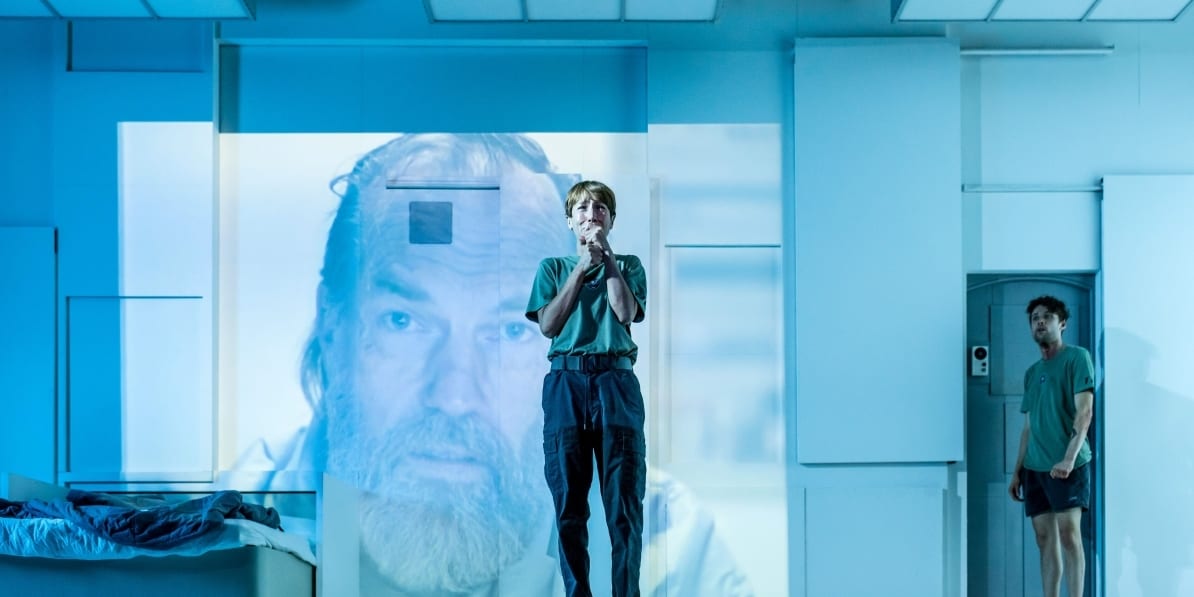Everyone will at some point feel the despair of being alone – loneliness is a truly universal emotion. It is fitting then, that Stanisław Lem chose to explore this feeling on a planetary scale with his novel Solaris. Previously told on screen, this adaptation by David Greig is its first outing on the stage.
Solaris follows psychologist Kris Kelvin (Polly Frame), who arrives on a space station at the end of a mission to explore ocean-covered planet Solaris. Already present are fellow scientists Sartorius (Jade Ogugua) and Snow (Fode Simbo), but it swiftly becomes apparent that all is not well. Sartorius and Snow are behaving oddly, and the planet itself seems to have a consciousness that is trying to communicate with those on board.
It does so by targeting vulnerable spots in the psyches of the protagonists, ensuring this piece of sci-fi is more about the human condition than space travel. Regret, loss and loneliness all feature heavily. Kris is so scarred she tries to befriend an entire alien planet rather than risk the empty feeling of being alone in a crowd.
Director Matthew Lutton directed the recent Lyceum production of Picnic at Hanging Rock and used abrupt periods of blackness between scenes to disorientate and unnerve. He does something similar here, this time conjuring a feeling of profound isolation, even in a crowded theatre. During the scenes, the claustrophobia of being alone in space is effectively conjured by the minimal but ingenious set, comprised of effectively mind-numbingly similar white cubes.
Inside these spaces, the protagonists suffer the effects of loneliness and repressed trauma. They drink too much, argue or retreat deeper and deeper into their own heads, where they can relive their pasts without mistakes. This is particularly the case for Polly Frame’s Kris.
Through her physical performance, Frame lets us see how fragile Kris’s dispassionate scientific veneer is as it becomes rapidly stripped away by her desperation to not be alone. The temptation to relive her past and atone for mistakes – even if in fantasy – is too alluring to resist, as it surely would be for most of us.

The focus of the second half wanders, with backstories for the other characters being introduced but not explored. This has the effect of pulling focus from Frame, while not delving deeply enough into the pasts of Sartorius or Snow to tell us anything new about loss and regret.
The play is more than just a meditation on how the cancer of loneliness can eat away at a person. In keeping with the consistent social consciousness shown by Lyceum productions, Solaris acts as a metaphor for the damage humans seem to do to everything we touch, especially planets. If the planet of Solaris really is conscious, then what unbearable cruelty might the protagonists unwittingly cause by making it aware of its own solitude? Can they leave before causing it irreparable damage?
Hell may well be other people, but to feel alone in a crowd, tormented by your own regrets about the past is far worse. The planet’s undeveloped but fast evolving consciousness, feeling the touch of others for the first time, provides an elegant metaphor to explore loneliness. Solaris may not provide many answers, but it is an atmospheric and thought-provoking play that captures the full horror of being truly alone.

